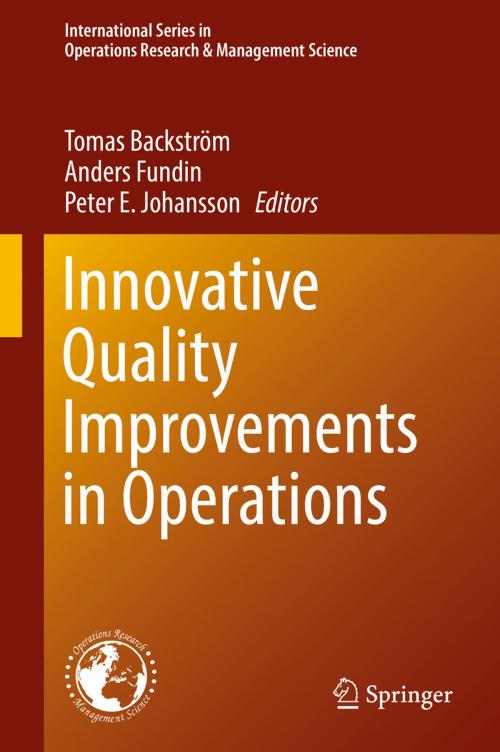Innovative Quality Improvements in Operations
Introducing Emergent Quality Management
Business & Finance, Management & Leadership, Operations Research, Production & Operations Management| Author: | ISBN: | 9783319559858 | |
| Publisher: | Springer International Publishing | Publication: | July 13, 2017 |
| Imprint: | Springer | Language: | English |
| Author: | |
| ISBN: | 9783319559858 |
| Publisher: | Springer International Publishing |
| Publication: | July 13, 2017 |
| Imprint: | Springer |
| Language: | English |
This book examines current and emerging challenges in manufacturing related to the ideal of developing production processes with variability and agility on one level of the system, combined with structures ensuring stability and robustness on another level; close to what by other scholars has been discussed in terms of continuous innovation. However, this ideal has proven to be difficult to achieve in practice, and there is a need for enhanced and more sophisticated theoretical models dealing with the complexity surrounding organizational conditions to foster incremental as well as radical change in production systems, and, at the same time to ensure stability over time.
As a theoretical frame of reference, a perspective on change where conflicting demands and conflicting activities, e.g., exploration and exploitation, are seen as intertwined and interdependent, is used throughout the book. The ideal from this perspective is to make use of such conflicting forces and to develop the change dynamics by keeping them in the same social system, not to structurally separate them in different departments or different initiatives.
The main purpose of the book is to address an increased need for quality improvement through innovation and disruptive change in production. Traditional theories and managerial models of production systems are developed with a focus on stability and improvement. There is a need for enhanced models to reach an ability to develop new future production systems. The goal of the book is to provide nuances and new perspectives giving more realistic models of the production system to be able to increase the change potentiality of the organization and thus the long-term competiveness. Learning and organizational perspectives are in focus as enablers to increase the understanding of a production system as such. Long-term competitiveness through adaptability and the potential for radical improvement is of importance throughout the book. The use of dualities and the concept of ambidextrous organizations as a frame of understanding is the innovative strength for this area.
This book examines current and emerging challenges in manufacturing related to the ideal of developing production processes with variability and agility on one level of the system, combined with structures ensuring stability and robustness on another level; close to what by other scholars has been discussed in terms of continuous innovation. However, this ideal has proven to be difficult to achieve in practice, and there is a need for enhanced and more sophisticated theoretical models dealing with the complexity surrounding organizational conditions to foster incremental as well as radical change in production systems, and, at the same time to ensure stability over time.
As a theoretical frame of reference, a perspective on change where conflicting demands and conflicting activities, e.g., exploration and exploitation, are seen as intertwined and interdependent, is used throughout the book. The ideal from this perspective is to make use of such conflicting forces and to develop the change dynamics by keeping them in the same social system, not to structurally separate them in different departments or different initiatives.
The main purpose of the book is to address an increased need for quality improvement through innovation and disruptive change in production. Traditional theories and managerial models of production systems are developed with a focus on stability and improvement. There is a need for enhanced models to reach an ability to develop new future production systems. The goal of the book is to provide nuances and new perspectives giving more realistic models of the production system to be able to increase the change potentiality of the organization and thus the long-term competiveness. Learning and organizational perspectives are in focus as enablers to increase the understanding of a production system as such. Long-term competitiveness through adaptability and the potential for radical improvement is of importance throughout the book. The use of dualities and the concept of ambidextrous organizations as a frame of understanding is the innovative strength for this area.















